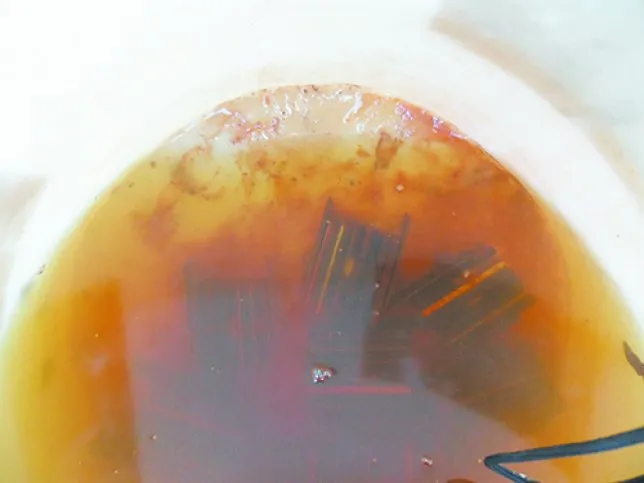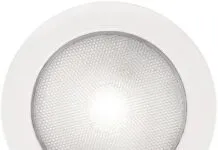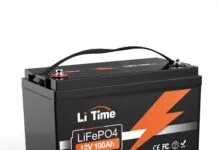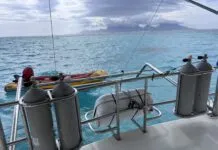
Something we have long noticed at PS is that gasoline and diesel control samples in our aging and corrosion studies never really age much. Only when the samples include metal samples do they generate gum and discolor. One explanation is refinery stability treatments, but the primary difference is that copper and zinc ions are powerful catalysts for polymerization. Shore-side fuel storage systems do not experience this type of break down because copper tubing, brass fittings and galvanized pipe are forbidden by code . The following requirements are quoted from standards groups and OEMs.
ASTM D975 Appendix X2.7.2
Copper and copper-containing alloys should be avoided. Copper can promote fuel degradation and may produce mercaptide gels. Zinc coatings can react with water or organic acids to form gels which rapidly clog filters.
British Petroleum
British Petroleum lists exposure to copper and zinc as the most damaging factors in long-term storage, before water and dirt. According to BP:
The ageing process can be accelerated by the following conditions:
- Contact with zinc, copper or metal alloys containing them. These metals will quickly react with diesel fuel to form unstable compounds.
- The presence of water. Water allows the growth of fungus and bacteria, these produce natural by-products such as organic acids which make the fuel unstable.
- Exposure to high temperatures.
- Exposure to dust and dirt which contain trace elements that can destabilize the fuel, such as copper and zinc.
- Fuel composition. Some components in diesel fuel naturally age quickly.
We researched installation requirements for diesel standby generators. Like boats that are stored seasonally, the fuel will just sit there for months. What we found was a unanimous condemnation of copper tubing and brass fittings:
Caterpillar
Black iron pipe is best suited for diesel fuel lines. Steel or cast iron valves and fittings are preferred.
CAUTION: Copper and zinc, either in the form of plating or as a major alloying component, should not be used with diesel fuels. Zinc is unstable in the presence of sulfur, particularly if moisture is present in the fuel. The sludge formed by chemical action is extremely harmful to the engines internal components.
Cummins
Diesel Fuel Piping. Diesel fuel lines should be constructed from black iron pipe. Cast iron and aluminum pipe and fittings must not be used because they are porous and can leak fuel. Galvanized fuel lines, fittings, and tanks must not be used because the galvanized coating is attacked by the sulfuric acid that forms when the sulfur in the fuel combines with tank condensate, resulting in debris that can clog fuel pumps and filters.
Copper lines should not be used because fuel polymerizes (thickens) in copper tubing during long periods of disuse and can clog fuel injectors. Also, copper lines are less rugged than black iron, and thus more susceptible to damage.
Note: Never use galvanized or copper fuel lines, fittings or fuel tanks. Condensation in the tank and lines combines with the sulfur in the diesel fuel to produce sulfuric acid. The molecular structure of the copper or galvanized lines or tanks reacts with the acid and contaminates the fuel.
Yanmar
Piping is specified as rubber or steel.
US Army CERDEC study, 1977
Galvanized storage tanks, piping and terne-coated vehicle tanks have led to serious field issues in the past. Zinc has a tendency to accumulate in spray-holes and contribute to nozzle coking. Lead (a component of terne plating) is attacked by fuel acids and forms soap precipitates. Copper may catalytically accelerate fuel oxidation and promote deposition of solids. Non-ferrous metals and their alloys should be excluded from use in fuel pipes and storage tanks and in the entire vehicle fuel system.
Ni-terne, used to coat the inside of the tank, can peel with exposure to biodiesel or bugs.
US Department of energy
Certain metals may affect the biodiesel by accelerating its oxidation process and creating fuel insolubles. Lead, tin, brass, bronze, and zinc significantly increase sediment formation in both B100 and B20. Galvanized metal and terne-coated sheet metal are not compatible with biodiesel at any blend level.
Conclusion
Should we rip out the fuel system, replacing copper and brass with flexible hose, steel, and aluminum? Lets not be hasty. PS recommended additives contain metal deactivators that sequester the offending ions, rendering them harmless. With a regular treatment program you are safe. But carefully consider your choice or materials when installing new equipment.

































Interesting to read your announcement on fuel additive tests and about potential copper effects in fuels; though long being established as a potential issue I guess this may be a problem in some areas around the world; for Europe the EN 590 (Diesel) and 228 (for petrol/Mogas) tolerate only little copper effect (“level 1”) hence this hasn’t made a lot of noise here; I view fuel additives in general as of little use but again this is a European view given that nearly all fuel additive packages to be applied by customers (beyond biocides) are rendered unwanted or not recommended here by the engine manufacturers.
Does my hardcopy subscription give me access
to the on line archives?
All the engine manufacturers have a statement about using copper/brass/bronze/zink alloys with diesel, and generally refer to this combination as being bad. However there are very few solutions to avoid copper/brass/bronze/zink products in your fuel system. Black iron or steel will rust.
I can get stainless tubing, which seems the better answer however its hard pressed to get stainless valves that will work. simple plumbing designs can use a standard stainless ball valve, but if you try to find a panel mount valve or a 3-way or 6port, its simply not happening easily if at all. this forces you to use more space at best, usually areas for your fuel selection valves are where you dont have a lot of space. instead of a 6 port your looking at 2 manifolds with a minimum of 2 valves each. panel valves are very difficult. i have only found the parker style valves, but you have to be very cautious that you get the correct size, port style or port size. Parker had 3 way valves. very frustrating. i also found some hydraulic electronic 6 port valves but these are fairly decent sized as well. hydraulic stuff is not really designed for fuels but should “in theory” work.
For the fuel lines, a cheaper alternative is PEX. when i looked into this it appears PEX is acceptable with diesel fuels. there is little to no studies or information on this. fittings would be cheaper just get stainless hose barbs. not sure if i could fully trust PEX here, but i will keep looking into it as stainless tubing is difficult to bend and expensive to run. 5/8″ pex is 1/2″ID and clamps to 1/2″ hose nipples well. PEX can deal with a decent amount of pressure, far more than fuel systems should be able to carry with most of our old mechanical low HP diesels.
I wonder if this is the same for Hydraulic fluid. i have a hydraulic steering system and it didn’t look much better than the diesel. PEX may work here as well but that would require a lot more research.